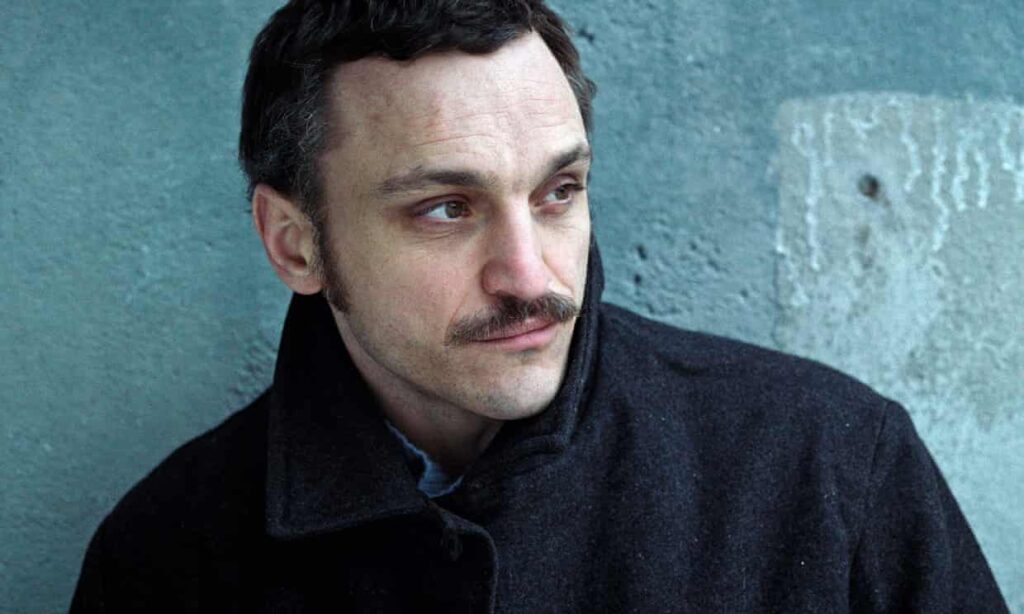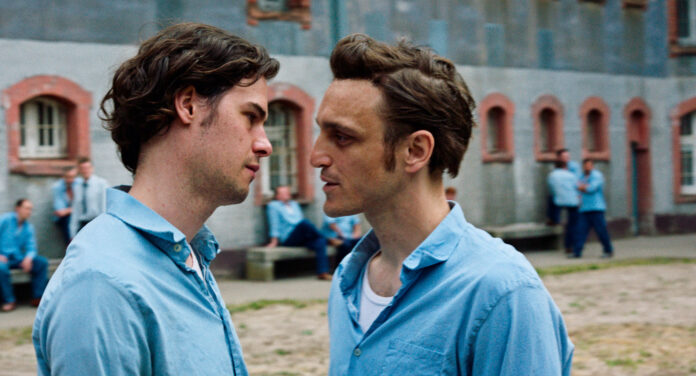One of the most interesting film actors to emerge from Europe in recent years, dance and theater-trained Franz Rogowski made an initial impression onscreen in films like the single-shot 2015 German thriller Victoria and as Isabelle Huppert’s embarrassing son in Michael Haneke’s Happy End two years later. But it was a couple subsequent features released to the US in 2019 that really drove home his ability to carry a film while seeming an unlikely candidate for it. One was Christian Petzold’s enigmatic refugee drama Transit, with Rogowski as a furtive romantic trying to flee in a (nonspecific) time of war; the other was Thomas Stuber’s somewhat lesser-seen In the Aisles, where he played a new hire who finds unexpected community amongst the employees of a Costco-like big box store.
Rogowski, who is German and 36 now, is “attractive” yet not particularly handsome in any conventional way. His mouth is a little “off,” and he’s got a (variably downplayed) lisp, both remnants of a cleft palate operation in childhood. In comparative terms, he’s got some of Joaquin Phoenix’s sensitive peculiarity, but his physically is more redolent of, say, Michael Stipe—an ascetic look, bordering on malnourishment. He’s played a lot of “lonely outsiders,” some outright oddballs and apparent simpletons. There’s a current of poetical, unpredictable otherness running through all his performances.
Though he actually has a pretty decent range—it just doesn’t strike one as such, because (unlike the chameleon contortions of someone like Jared Leto) he always underplays, even when the character’s actions or circumstances are somewhat outre. It’s hard to imagine him giving a loud performance. His figures have a tangible, knotty soul that quietly draws us in, more than any exterior behavior.
Characteristically he makes something engrossingly low-key out of Great Freedom, which most actors would treat as a gift-wrapped invitation to execute a flamboyant, histrionic tour de force. Austrian director Sebastian Meise’s Cannes prize-winner introduces the actor as one Hans Hoffmann in 1968, being surreptitiously filmed having sexual encounters with strangers in a public toilet. That footage is later shown in court, earning him a 24-month prison stint for violation of Paragraph 175, the German law that had criminalized homosexuality since 1871, surviving even after being used as an excuse to round up and kill thousands of gays in Nazi concentration camps.

Evidently this isn’t Hans’ first stint in the joint: He soon spies in the workroom an old acquaintance, Viktor (Georg Friedrich), who’s been here a long time for a different type of offense. We don’t realize quite how far their semi-surly friendship goes back until Hans is thrown into solitary, and he flashes back to 1945. When he was released from a concentration camp—and, incredibly, made to serve out the rest of his sexual-deviant sentence in a regular prison by the Allied authorities who’ve chucked out the Nazis. Realization of that injustice somewhat softens cellmate Viktor, who at first had been violently angry at sharing space with a “pervert.”
They are not lovers—at least, not for a long time. Meanwhile, Hans is in and out of custody, apparently unable to hide his desires (or feel he ought to) in the outside world, sometimes jailed with boyfriends (Thomas Penn) or casual pickups (Anton von Lucke) who are considerably more horrified by incarceration than he is. It’s not that Hans, or Viktor for that matter, wants to be in jail, it’s just that he’s resigned to it—and to society having no alternative place for him. When Great Freedom finally gets around to the end of Paragraph 175 (it was repealed just before it would have “celebrated” a centenary), Hans gets his first taste of life as a liberated homosexual among out-’n’-proud others—and it’s a little more than he can handle.
As it slides back and forth between periods (also including a passage in the late 1950s), a structure that is somewhat confusing for a while, Great Freedom less reflects the times than it does the unchanging rhythms of prison life. This film recalls others, from Fortune & Men’s Eyes to Bent and The Shawshank Redemption, though without the cautionary brutality or overt editorializing of the first two, and with a much less pronounced sense of epic narrative arc than the latter. It’s a story that spans a quarter century, encompasses death and cruelty as well as moments of humor and tenderness. But throughout it remains resistant to melodrama or stylistic showiness, so the poignancy sneaks up on you. Meise, like his star, prefers to communicate in lower case rather than screaming headlines. Great Freedom opens Fri/15 at theaters including the Opera Plaza and Shattuck.
MUBI, its US distributor, is also having a mini-Franz Rogowski retrospective later this month on its streaming platform. In addition to the aforementioned Transit (which we previously reviewed here) and In the Aisles (reviewed here), MUBI will be showing last year’s Luzifer, in which the actor plays a sort of holy fool, a man raised in near-complete isolation by his somewhat cracked ex-addict mother (Susanne Jensen), their days spent subsistence-farming, training predator birds, and in maintaining a very individualized state of Christian/pagan worship.
But this near-Kaspar Hauser-ish existence in the Austrian Alps is challenged by developers who covet this spectacularly prime location. And when mom refuses to be bought out, their intimidation tactics get very…aggressive. Not quite the horror (or even revenge) movie you might expect, Peter Brunner’s film is less satisfying in narrative or thematic than purely visual terms. But Rogowski has no trouble whatsoever convincing us as an adult wild child—near-feral, as spontaneous and fearful as a baby, utterly oblivious to society’s conventions and a poor bet to ever adapt to them. Luzifer begins streaming on MUBI April 25 (more info here), with the other two films following in the month’s remaining days.
Other new films of note:
Paris, 13th District
If the typical Franz Rogowski movie (insomuch as you could say such a thing exists) finds him in a situation where prospects for ordinary relationships are remote-to-nil, the 30-ish characters in Jacques Audiard’s new film suffer if anything from too many options. Emilie (Lucie Zhang) is rebelling against her Taiwanese family of high achievers, drifting along in a telemarketing job, clubbing and hooking up with guys met online.
Seeking a flatmate to pay the bills (so she doesn’t have to), she’s initially put off by teacher Camille (Makita Samba) being a man—the name does suggest otherwise—but that doesn’t prevent her from letting him move in, or indeed enjoying some mutual sexytime. Despite her own brusque and impulsive nature, however, she takes offense when he declares “I don’t want to be a couple with anyone.”
He’s moved out by the time he meets Nora (Noemie Merlant), who re-entered law school after some years in real estate. But that didn’t work out for bizarre reasons, so she ends up in an office with Camille (who’s also made a career change), then in his bed as well. Although she has some issues with sex, it turns out. Will these still-youngish, semi-interesting, fairly-attractive people get their separate and collective shit together? Will we care? I didn’t: I can’t think of a movie whose fadeout declaration of love seemed to matter less.
Audiard has written and directed a number of compelling movies over the last quarter century of so, including Rust and Bone and A Prophet. They all seemed much more consequential than this tumble through various sheets in Rohmer territory, with petulant figures not sure whether they like each other or not. The film’s non-glam Parisian locations and B&W photography recall the Nouvelle Vague, though the breezy shallowness of the characters may stir memories of such navel-gazing 90s rom-coms as Reality Bites and Chasing Amy. (It’s also got the latter’s dubious male-fantasy grasp on lesbians.)
Does 71-year-old Audiard mean for these people (esp. the obnoxious Emilie) to seem so unworthy of having a movie about them? He certainly does not appear to have his finger on their zeitgeist, and all the nudity/sex scenes feel more gratuitous than revealing. Paris, 13th District adapts several stories from the Optic Nerve comic book series by Adrian Tomine, and it’s easy to imagine that what looks more like labored voyeurism onscreen played as witty millennial self-examination on the printed page. This isn’t exactly a bad film, more just a somewhat puzzling and pointless one—but it’s still its director’s worst. It opens in theaters Fri/15 including the Opera Plaza and Shattuck.
Dual
30-ish rudderlessness has considerably more satirical kick in this very deadpan comic fantasy from writer-director Riley Stearns. I disliked his last film, The Art of Self-Defense, but despite this having a similar basic plot arc—milquetoast protagonist methodically trains for vengeance with a demanding-if-not-outwardly-impressive defense guru—it’s got a much more distinctive and original feel. Scottish actress Karen Gillan plays Sarah, a solidly nondescript American suburbanite (though the film was, weirdly, shot in Finland) whose main occupations in life are avoiding her pushy mother’s calls, and not-particularly-missing the live-in boyfriend (Beulah Koale) who’s out of town on an extended business trip.
Then out of the blue, some signs of ill health lead her to learn she has an “incredibly rare terminal disease.” This being the near-future, or a lookalike parallel universe, there is now an option in such circumstances: Sarah can have herself cloned, “so your loved ones don’t suffer the loss of you.” An hour after saying yes, the miracle of biotechnology has provided her a bona fide doppelganger logically called Sarah Double to take home and train in being just like Sarah Original. Only the Double turns out to be better liked by everyone (including the BF and mom), which becomes a real problem once Original Sarah discovers oops, she’s not dying after all. Which somehow means she now has a year to train (with Aaron Paul as professional “Cheap Personal Combat Trainer” Trent) for a duel-to-the-death with her twin, featuring a full array of weapons and spectators.
Dual’s concept is outlandish, but its humor is so reined-in, and its performers so poker-faced, you might not at first even realize it’s a comedy. It’s actually a good one, though. There are echoes here of everything from The Stepford Wives to The One I Love. Yet the sci-fi concept mostly feels like just a clever hook on which to hang a singularly droll portrait of slightly hapless people not quite knowing how to live their lives—it’s no wonder something from a test tube is able to figure it out better. Dual opens Fri/15 in theaters including the Alamo Drafthouse, then gets released to home formats on May 20.







